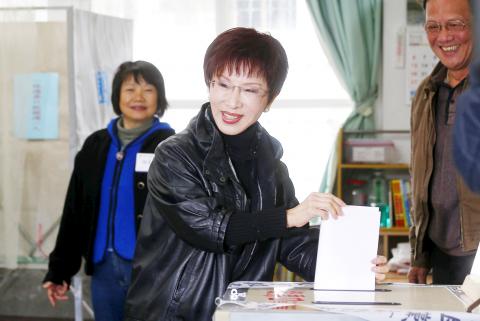The Chinese Nationalist Party (KMT) yesterday elected former deputy legislative speaker Hung Hsiu-chu (洪秀柱) as the party’s first chairwoman in its more than 100-year history.
Hung secured 56.16 percent of the vote in the by-election, receiving 78,829 out of 140,358 votes cast, sparing the need to go to a second round of voting, which would have been required if none of the four candidates garnered more than 50 percent of the vote.
Voter turnout was 41.61 percent from a total of 337,351 eligible voters.

Photo: Reuters
KMT Acting Chairperson Huang Min-hui (黃敏惠) placed second, securing 46,341 votes, or 33.02 percent.
Taipei City Councilor Lee Hsin (李新) finished third, winning 7,604 votes, or 5.42 percent, while Legislator Apollo Chen (陳學聖) won 6,784 votes, or 4.83 percent.
After the final results were published, Hung thanked all party members, regardless of whether they voted for her, for staying with the party and showing their support when the party is at its nadir.
“As long as we are together, solidarity and hope will be in our hands. I will lead the party to restore our homeland, which has been in ruins,” she said.
When asked what her plan for cross-strait affairs would be and whether she would plan a trip to China, she said that she has no such plans, adding that KMT-Chinese Communist Party dialogue would continue.
“We can have a firmer grasp of our future if we have a better understanding of [China] and if we can help convey [China’s responses] to the government,” she said.
According to statistics provided by the KMT, Hung received the greatest support in Kinmen County, among overseas KMT members and in Lienchiang County, securing 85.58 percent, 78.51 percent and 74.66 percent of votes respectively.
Hung also received broad support in the two largest electoral districts — New Taipei City (41,405 possible voters who cast 16,792 votes) and Kaohsiung (42,420 voters who cast 16,094 votes) — where she received 10,924 votes and 9,360 votes respectively, whereas Huang received 4,131 and 4,956 votes respectively.
The by-election was marred by numerous reports of election violations.
A day before the by-election, several Internet users posted messages on the Professional Technology Temple — Taiwan’s largest online academic bulletin board — saying that older members of their families who are KMT members had received two voting notifications with different numbers, meaning that they would be able to vote twice.
Hung’s office yesterday reported a number of voting irregularities encountered across the nation, such as people trying to vote without notifications or identification, voters trying to cast ballots for another person, voting booths that were not curtained off and posters campaigning for Huang placed on the doors of polling stations.

Intelligence agents have recorded 510,000 instances of “controversial information” being spread online by the Chinese Communist Party (CCP) so far this year, the National Security Bureau (NSB) said in a report yesterday, as it warned of artificial intelligence (AI) being employed to generate destabilizing misinformation. The bureau submitted a written report to the Legislative Yuan in preparation for National Security Bureau Director-General Tsai Ming-yen’s (蔡明彥) appearance before the Foreign Affairs and National Defense Committee today. The CCP has been using cognitive warfare to divide Taiwanese society by commenting on controversial issues such as Taiwan Semiconductor Manufacturing Co’s (TSMC, 台積電) investments in the

INVESTIGATION: The case is the latest instance of a DPP figure being implicated in an espionage network accused of allegedly leaking information to Chinese intelligence Democratic Progressive Party (DPP) member Ho Jen-chieh (何仁傑) was detained and held incommunicado yesterday on suspicion of spying for China during his tenure as assistant to then-minister of foreign affairs Joseph Wu (吳釗燮). The Taipei District Prosecutors’ Office said Ho was implicated during its investigation into alleged spying activities by former Presidential Office consultant Wu Shang-yu (吳尚雨). Prosecutors said there is reason to believe Ho breached the National Security Act (國家安全法) by leaking classified Ministry of Foreign Affairs information to Chinese intelligence. Following interrogation, prosecutors petitioned the Taipei District Court to detain Ho, citing concerns over potential collusion or tampering of evidence. The

‘COMPREHENSIVE PLAN’: Lin Chia-lung said that the government was ready to talk about a variety of issues, including investment in and purchases from the US The National Stabilization Fund (NSF) yesterday announced that it would step in to staunch stock market losses for the ninth time in the nation’s history. An NSF board meeting, originally scheduled for Monday next week, was moved to yesterday after stocks plummeted in the wake of US President Donald Trump’s announcement of 32 percent tariffs on Taiwan on Wednesday last week. Board members voted to support the stock market with the NT$500 billion (US$15.15 billion) fund, with injections of funds to begin as soon as today. The NSF in 2000 injected NT$120 billion to stabilize stocks, the most ever. The lowest amount it

NEGOTIATIONS: Taiwan has good relations with Washington and the outlook for the negotiations looks promising, Minister of Economic Affairs J.W. Kuo said Taiwan’s GDP growth this year is expected to decrease by 0.43 to 1.61 percentage points due to the effects of US tariffs, National Development Council (NDC) Minister Paul Liu (劉鏡清) said at a meeting of the legislature’s Economics Committee in Taipei yesterday, citing a preliminary estimate by a private research institution. Taiwan’s economy would be significantly affected by the 32 percent “reciprocal” tariffs slapped by the US, which took effect yesterday, Liu said, adding that GDP growth could fall below 3 percent and potentially even dip below 2 percent to 1.53 percent this year. The council has commissioned another institution